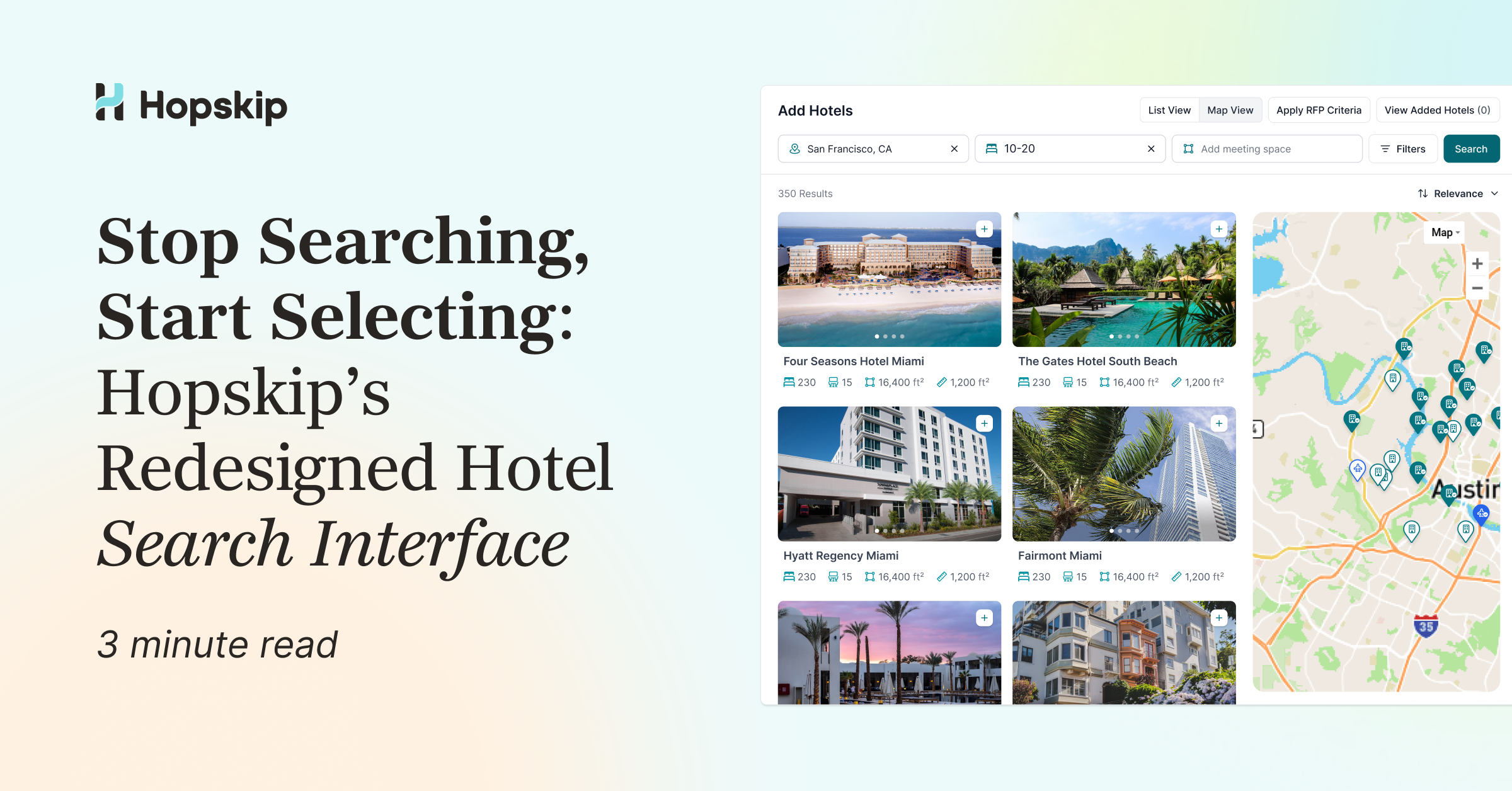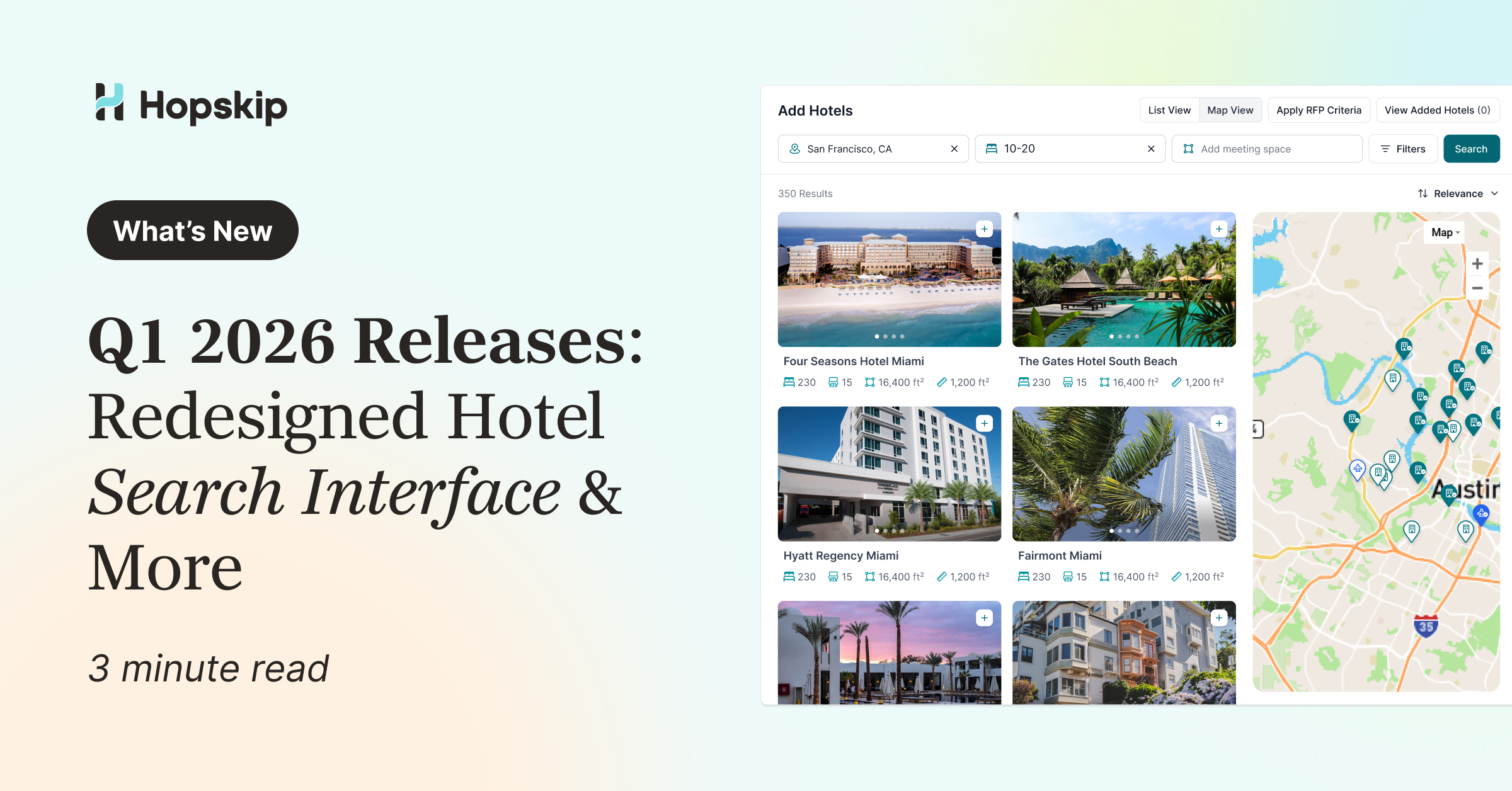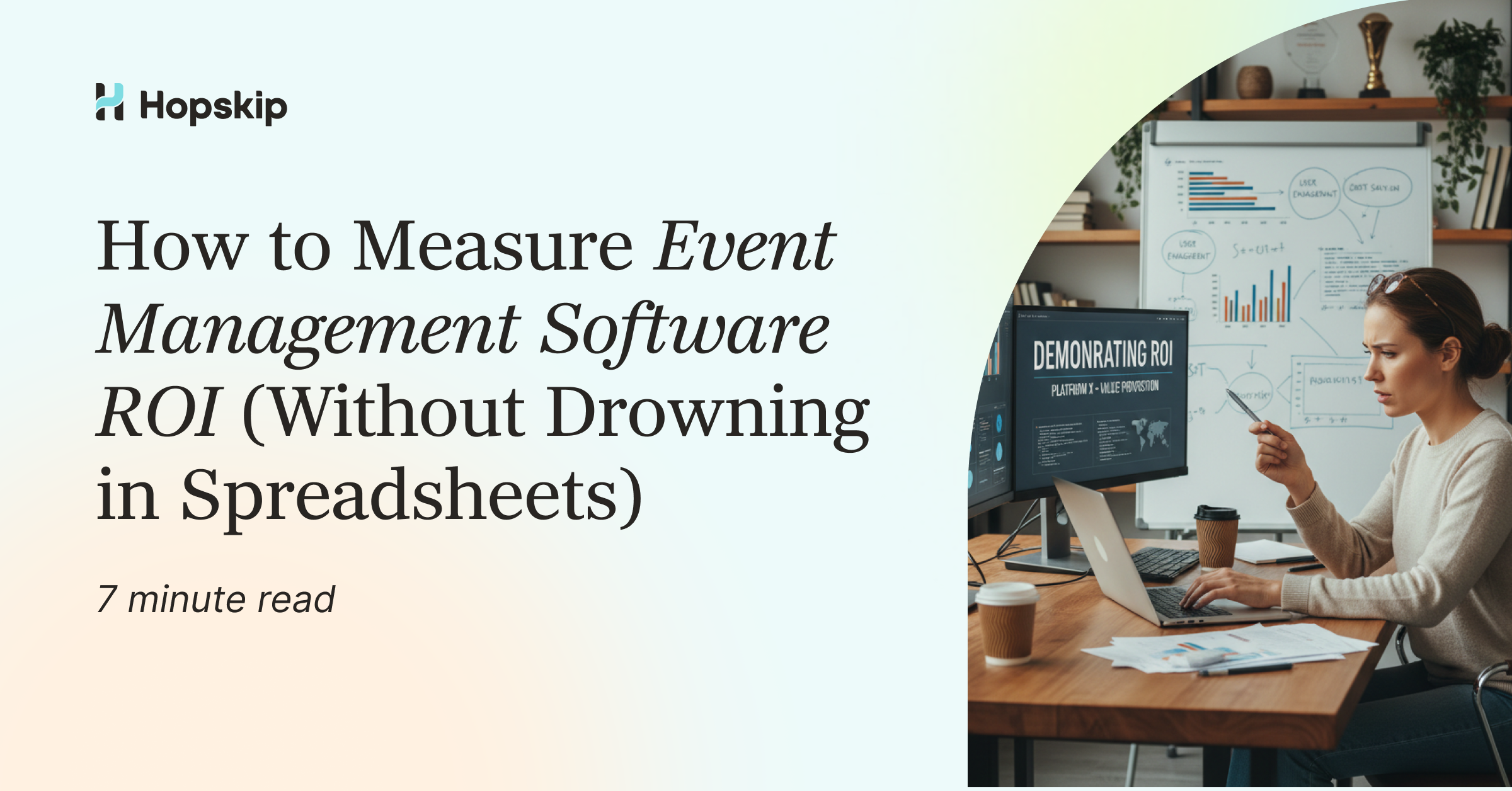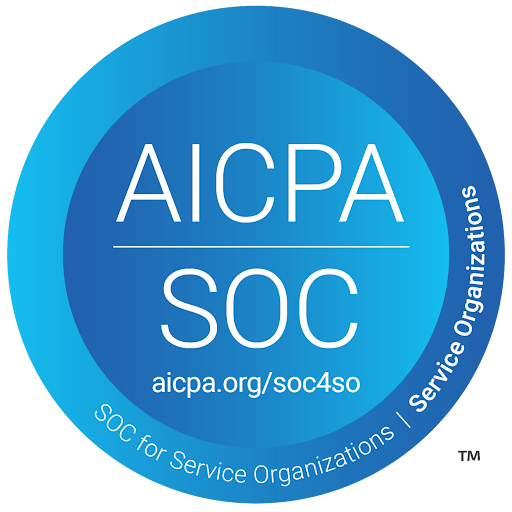Event Planner Glossary
Explore 75+ event planner definitions in this complete glossary designed to simplify industry jargon and boost clarity in your planning process.
Introduction
If you’re reading this, you’re already wearing many hats: creative visionary, logistical juggler, budget-whisperer, timeline enforcer—and yes, you’re also a translator of the event industry’s jargon. As an event planner, you live in the thick of acronyms, contracts, venue speak, vendor lingo, and sometimes it feels like you need a Rosetta Stone just to keep up.
That’s why we at Hopskip believe a solid glossary of definitions isn’t just nice to have, it’s essential. When you and your stakeholders (clients, vendors, venue staff) speak the same language, execution gets smoother, surprises get fewer, and you get to focus more on creativity and less on confusion.
In this post, we’ll walk through key terms every event planner should know. Let’s dive in.
Event Planner Glossary
Agenda / Event Timeline — A structured schedule outlining every element of the event, from start to finish.
AR (Augmented Reality) — Digital elements overlaid onto real environments to enhance attendee engagement.
Attrition Clause — Contract language outlining penalties if your group fails to meet minimum room or service usage.
Attendee Experience (AX) — The full journey an attendee takes before, during, and after your event.
Audio-Visual (AV) — All technical equipment: microphones, speakers, projectors, lighting, and streaming gear.
Banquet Event Order (BEO) — A venue-generated document summarizing food, timing, staffing, and setup details.
Blackout Dates — Days when a venue or hotel will not offer group rates due to high demand.
Breakout Session — Smaller sessions or workshops that run alongside a main event.
Budget — The financial plan that guides every aspect of your event’s decisions.
Capacity — The maximum number of people a venue or room can safely accommodate.
Caterer — The vendor responsible for food and beverage service.
Check-In — The attendee arrival process, often managed via an app, kiosk, or registration desk.
Cut-Off Date — The last day attendees can book rooms within the group rate before prices rise.
Contract — A legally binding agreement outlining event, venue, and vendor obligations.
Creative Brief — A document outlining event vision, goals, and messaging for stakeholders.
Crescent Rounds — A seating layout with chairs placed around half of a round table facing the stage.
DEI (Diversity, Equity & Inclusion) — Ensuring your event is accessible, inclusive, and welcoming.
Décor — All visual design elements: florals, signage, furniture, lighting, and branding.
Digital Signage — Screens used for agendas, directions, or event branding.
DMC (Destination Management Company) — Local experts providing logistical support and on-the-ground services.
Drop-Down Banner — Vertical signage used for branding or wayfinding.
Early-Bird Tickets — Discounted tickets offered in the early stages of registration.
Engagement Metrics — Data showing participation levels, session attendance, and attendee interactions.
Event — A structured gathering with a defined purpose or outcome.
Event App — A mobile platform for agendas, maps, networking, polling, and messaging.
Event Design — The creative concept, aesthetics, and experiential layout of the event.
Event Management Software (EMS) — Platforms supporting registration, analytics, and planning workflows.
Event Planner — The professional responsible for designing and executing all aspects of the event.
Exhibit Hall — The space where exhibitors set up booths at conferences or trade shows.
Exhibitor — A company or individual hosting a booth at a trade show.
Floor Plan / Venue Layout — A graphical representation of the event space’s setup.
Force Majeure Clause — Contract protection for unforeseen events like emergencies or natural disasters.
Foyer / Pre-Function Space — Areas outside the main event rooms used for networking or reception.
General Session — The main gathering for all attendees, often keynotes or major announcements.
Green Room — A private backstage space for speakers or VIPs.
Guest Room Block — A reserved set of hotel rooms at a negotiated group rate.
Headcount — The confirmed number of attendees.
Highboy Table — A tall cocktail table often used for receptions or networking areas.
Hybrid Event — A mix of in-person and virtual participation.
Incentive Trip — A reward travel experience designed to motivate and recognize performance.
In-House AV — The AV provider contracted by the venue.
Interactive Experience — Activities encouraging participation: polls, games, demos, or immersive tech.
Keynote Speaker — The featured speaker delivering the event’s central message.
Lead Time — The planning window before an event takes place.
Livestream — Broadcasting event content in real time.
Load-In — Vendor setup time before the event.
Load-Out — Vendor breakdown time after the event.
Lodging Agreement — A contract outlining hotel room blocks, rates, and policies.
Logistics — The detailed coordination of people, services, timelines, and operations.
Master Account — The main billing account for all event charges at a hotel or venue.
Mic Runner — A staff member who brings microphones to audience members during Q&A.
Move-In / Move-Out — Terms for setup and teardown windows for trade shows and large events.
Name Badge — Attendee identification worn during the event.
No-Show — A person who registered but does not attend.
On-Site Coordinator — A planner or staff member overseeing event execution day-of.
Panel Discussion — A moderated conversation among multiple speakers.
Pipe and Drape — Fabric and poles used to divide room spaces or build booths.
Plated Meal — A formal meal served individually to guests at their seats.
Post-Event Survey — A feedback form measuring attendee satisfaction.
Press Kit — Media materials supporting PR and announcements.
Registration — The attendee sign-up and check-in process.
Request for Proposal (RFP) — The document planners send to venues/vendors outlining needs.
Rigging — Suspended lighting, signage, or décor hung from ceiling trusses.
Room Setup — The arrangement of tables, chairs, and staging.
Rooming List — A list of guest names assigned to rooms within the block.
Run of Show (ROS) — The minute-by-minute production outline.
Scenic Design — The visual design of stages, backdrops, and production elements.
Show Floor — The area where exhibitors set up displays.
Signage — Printed or digital visuals for information, branding, or navigation.
Speaker Rider — A document outlining a speaker’s technical and hospitality needs.
Stakeholders — Anyone invested in the event’s success: leadership, sponsors, attendees, vendors.
Stage Manager — The person coordinating production elements and speaker cues.
Strike — Breaking down and removing all event elements after load-out.
Sponsor — A partner who financially supports the event in exchange for visibility.
Sponsorship Package — The benefits and pricing offered to event sponsors.
Tech Rehearsal — A full test of AV, lighting, cues, and transitions.
Venue Sourcing — The research and evaluation process for selecting the best location.
VIP Management — Coordinating special needs for high-level guests or speakers.
Walkthrough — A pre-event venue visit to confirm layout, logistics, and flow.
Wayfinding — Signage and directional tools that help attendees navigate a space.
At Hopskip, we're here to help you build events that connect people to place, purpose, and each other. Ready to explore venues and event-flow tools that support the full experience? Let's connect and make your next event one people actually remember (for the right reasons). Book a demo with a member of our team today.
Subscribe to our newsletter
Related Posts

Goodbye Friction, Hello Efficiency: The Most Significant Update to Hotel Sourcing This Year
Introducing Hopskip's new and improved hotel venue search tool. Filter 150k+ enriched hotels instantly using the 'Apply RFP Criteria' toggle. Faster, intuitive venue discovery for planners.
.svg)





.svg)

